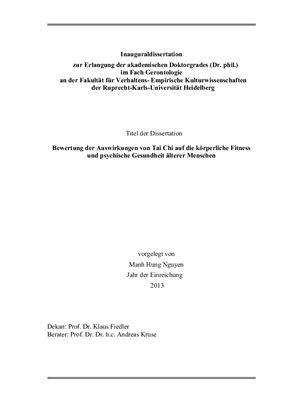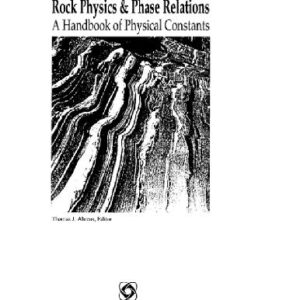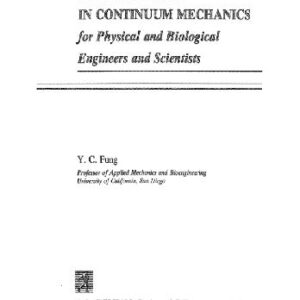Doctoral dissertation. ? Heidelberg: Karls-Universit?t Heidelberg, 2013. ? 189 p.
??????????? ?? ?????????? ?????.Contents:
Abstract.
Introduction.
Background and significance of the study
Aims of intervention
Hypotheses
Leading constructs
Health
Aging
Blood pressure
Mental health
Quality of life and health related quality of life
Physical activity
Physical exercise
Physical fitness
Muscular strength
Aerobic Endurance
Flexibility
Agility/dynamic balance
Literature review
Aging and physical changes associated with aging
Effects of physical activities for the orderly?s health
Exercise and physical activity for psychological health and well-being
Physical activity for cognitive functioning, and aging
Physical activity and quality of life in old age
Physical exercise and risk of falls
Tai Chi
History of Tai chi
The Origin of the First Combined Forms
Adaptation to Vietnam
Effects of Tai Chi exercise
Cardiovascular and Cardio-respiratory functions
Flexibility
Musculoskeletal improvement
Psychological functions and wellness
Coronary artery diseases
Hypertension
Balance and prevention of falls
Neurological, chronic diseases and pain
Bone function, osteoarthritis and rheumatoid arthritis
Aging population in Vietnam
Aging population in Germany
Design and Methodology
Research design
Participants
Design
Test protocol
Instrumentation
Tai Chi program
Tai Chi group (TC)
Control group (CT)
Validation and reliability of measurement
Empirical processes
Data collection and safety
Statistical analysis
Results
Characteristics of the sampling groups
Current situation of exercise training of older people in Vinh City
Comparison of results between the Tai Chi and the Control group at the baseline
Comparison of blood pressure, BMI, and WHR
Comparison of results of physical component measurement between TC
Subjectively perceived health between TC and CT
Comparison of sleep quality between TC and CT
Comparison of cognitive performance between TC and CT
Comparison of results between Tai Chi and Control groups at Midpoint
Comparison of blood pressure, BMI, and WHR
Comparison of results of physical component measurement between TC & CT
Subjectively perceived health between TC and CT
Comparison of sleep quality between TC and CT
Comparison of motor speed and visual attention between TC and CT
Comparison of results between the Tai Chi and the Control groups the endpoint
Comparison of blood pressure, BMI and WHR
Comparison of results of physical component measurement between TC & CT
Subjectively perceived health between TC and CT
Comparison of sleep quality between TC and CT
Comparison of motor speed and visual attention between TC and CT
Comparison of results at three periods of test between the TC and TC groups
Comparison of BMI, WHR and blood pressure of within- subjected effect
Comparison of physical measurement of within-subjected effect
Comparison of subjectively perceived health of within-subjected effect
Comparison of sleep quality of within-subjected effect
Comparison of Cognitive performance of within-subjected effect
Identification of multi factorial interaction among dependent and independent variables
Within the group comparison of the Tai Chi exercise at end-point and follow-up
Differences of means among the Tai Chi, the Control and the Drop out
Differences in physical fitness and subjectively rated health between German and Vietnamese older adults
Discussion
Effects on blood pressures
Effects on physical fitness
Effects on balance and falls
Effects on self-rated health
Effects on sleep and cognitive performance
Cross-cultural preliminary study
Limitations and problems faced in the study
Conclusion
Implication
Further study
Conclusion
References
Appendixes
Photos taken at tests
Presentation and publication
List of abbreviations.
Physical
{pdf} Evaluating the effects of Tai Chi on physical fitness and mental health of the elderly Manh Hung Nguyen.
$19.99






Reviews
There are no reviews yet.